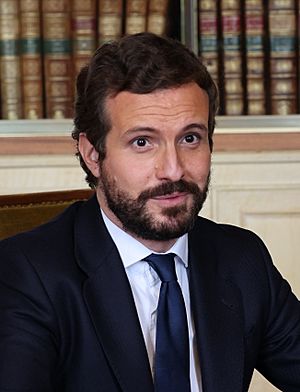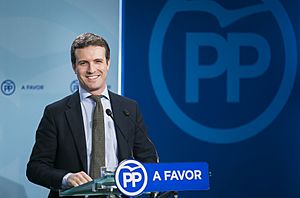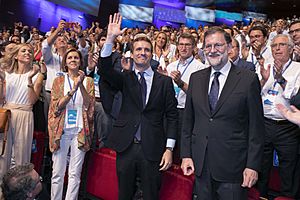Pablo Casado facts for kids
Quick facts for kids
The Most Excellent
Pablo Casado
|
|
|---|---|

Casado in 2020
|
|
| Leader of the Opposition | |
| In office 21 July 2018 – 2 April 2022 |
|
| Monarch | Felipe VI |
| Prime Minister | Pedro Sánchez |
| Preceded by | Mariano Rajoy |
| Succeeded by | Alberto Núñez Feijóo |
| President of the People's Party | |
| In office 21 July 2018 – 2 April 2022 |
|
| Secretary-General | Teodoro García Egea |
| Preceded by | Mariano Rajoy |
| Succeeded by | Alberto Núñez Feijóo |
| Deputy Secretary-General of Communications of the People's Party | |
| In office 18 June 2015 – 21 July 2018 |
|
| President | Mariano Rajoy |
| Preceded by | Carlos Floriano |
| Succeeded by | Marta González |
| Member of the Congress of Deputies | |
| In office 13 December 2011 – 4 April 2022 |
|
| Constituency | Ávila (2011–2019) Madrid (2019–2022) |
| Member of the Assembly of Madrid | |
| In office 13 June 2007 – 9 July 2009 |
|
| Personal details | |
| Born |
Pablo Casado Blanco
1 February 1981 Palencia, Castile and León, Spain |
| Political party | People's Party |
| Spouse |
Isabel Torres Orts
(m. 2009) |
| Children | 2 |
| Education | Douai School ICADE CES Cardenal Cisneros King Juan Carlos University |
Pablo Casado Blanco (born 1 February 1981) is a Spanish former politician. He was a member of the Congress of Deputies, which is like the main parliament in Spain. He represented Madrid until April 2022. Before that, he represented Ávila from 2011 to 2019. From 2015 to 2018, he was a vice secretary general for communication for the People's Party (PP). He also served as the president of the PP from July 2018 until April 2022.
Contents
About Pablo Casado
Early Life and School
Pablo Casado was born on February 1, 1981, in Palencia, Spain. He has five brothers. His father was a doctor, and his mother was a university professor in nursing. His family owns an eye clinic in his hometown. He went to Colegio Castilla and also studied for a year at Douai School in the United Kingdom.
Casado started studying law at ICADE in Madrid in 1999. Later, in 2004, he moved to another center, CES Cardenal Cisneros, where he finished his law degree in September 2007. He also earned a degree in Business Administration and Management and a master's degree in Administrative Law from King Juan Carlos University (URJC).
Starting in Politics
Casado began his political journey when he joined the People's Party (PP) in 2003 while he was still a student. He led the youth branch of the PP in Madrid, called the New Generations (NNGG), from 2005 to 2013. In 2007, he visited Cuba and met with people who disagreed with the government there.
In 2007, he was elected to the Assembly of Madrid, which is the regional parliament. He worked there as a spokesperson for justice and public administration. He left this role in July 2009. In June 2009, he married Isabel Torres Orts. They have two children, a daughter named Paloma and a son named Pablo.
From 2009 to 2012, Casado worked for former Prime Minister José María Aznar. During this time, in 2010, he helped start a group called the Friends of Israel Initiative, which is a think tank.
Becoming a National Politician
In November 2011, Casado was elected to the Congress of Deputies, representing Ávila. He was re-elected in the 2015 and 2016 general elections. In June 2015, the president of the PP, Mariano Rajoy, appointed him as the vice secretary general of communication for the party.
Leading the People's Party
After Mariano Rajoy stepped down as leader of the PP in 2018, Pablo Casado decided to run for the party's presidency. He wanted to bring back voters who had left the PP for other parties like Citizens and Vox.
In the first round of voting, Casado came in second. Then, on July 21, 2018, a final vote was held among party delegates. Casado won with 1,701 votes (57.2%) and became the new president of the PP. This was seen as a move towards a more conservative direction for the party.
Elections and Challenges
In 2019, Spain had a general election. Casado's party lost many seats, which was a difficult time for him. However, in the November 2019 general election, the PP made a good recovery. They increased their seats from 66 to 89, becoming the main opposition party again.
In 2022, Casado's leadership faced a challenge from Isabel Díaz Ayuso, a popular politician from Madrid. Many party leaders and members asked Casado to resign. He stepped down as PP leader and a Member of Parliament on April 4, 2022. Alberto Núñez Feijóo took over as the new party leader. Casado gave a farewell speech, emphasizing his loyalty to the PP and asking for unity within the party.
Political Ideas
Casado describes himself as a liberal-conservative. This means he believes in ideas like lower taxes, supporting small businesses, and policies that help families. He has been compared to other conservative leaders.
He has spoken about the importance of the unity of Spain and has strong views against movements that want parts of Spain to become independent. He also believes in protecting the Spanish monarchy and has defended the King of Spain.
Casado has also talked about the "Hispanidad", which refers to the shared culture and history of Spanish-speaking countries. He sees it as a great achievement. On economic matters, he promised to remove certain taxes and lower income and business taxes.
After Politics
After leaving politics, Pablo Casado co-founded a company called Hyperion Fund. This company invests in technologies related to defense, aerospace, and cybersecurity. Within its first year, it successfully raised its target of €150 million from various investors.
How Pablo Casado Was Elected
| Election | List | Constituency | List position | Result |
|---|---|---|---|---|
| 2007 Madrilenian regional election | PP | - | 40th (out of 120) | Elected |
| 2011 Spanish general election | PP | Ávila | 2nd (out of 3) | Elected |
| Las Navas del Marqués local election, 2015 | PP | - | 13th (out of 13) | Unelected |
| 2015 Spanish general election | PP | Ávila | 1st (out of 3) | Elected |
| 2016 Spanish general election | PP | Ávila | 1st (out of 3) | Elected |
| 2019 Spanish general election | PP | Madrid | 1st (out of 37) | Elected |
Images for kids
-
Casado in front of the Walls of Ávila in September 2018 during a ceremony for the opening of the political year.
See also
 In Spanish: Pablo Casado para niños
In Spanish: Pablo Casado para niños
 | Emma Amos |
 | Edward Mitchell Bannister |
 | Larry D. Alexander |
 | Ernie Barnes |





